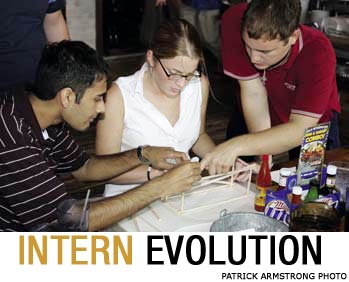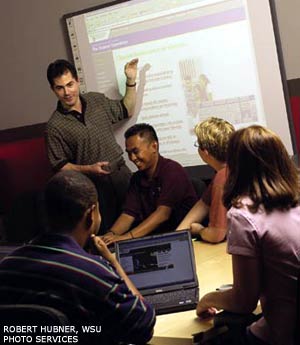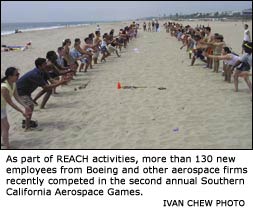| 

| Top: Houston interns (from left)
Neel Sheth, Krystal Smith and Jacob Counts work together on a competitive
project at off-site team-building exercises. In addition to off-site
activities, Houston interns also had opportunities to meet with senior
management. |
 By
definition, an intern is a student or recent graduate undergoing supervised
practical training. Through its commitment to education and lifelong learning,
Boeing has taken that definition one step further: It looks at today's interns
as tomorrow's employees. By
definition, an intern is a student or recent graduate undergoing supervised
practical training. Through its commitment to education and lifelong learning,
Boeing has taken that definition one step further: It looks at today's interns
as tomorrow's employees.
In a world that places employment value on expertise
and knowledge, internships have become strategically important for both
the interns and the companies which they work. The competitive challenges
facing college graduates have resulted new breed of interns walking the
halls—serious, determined, and ready to succeed.

Boeing helps bring classroom of the future
to WSU
Thanks to a $99,000 charitable contribution from The Boeing Company,
the future of learning without wires has become a present-day reality
on the campus of Washington State University in Pullman, Wash. Though
a formal dedication is scheduled for Oct. 4, The Boeing Wireless
Classroom of the Future has been in use by faculty and students
since January and is a showpiece stop on campus tours by visiting
dignitaries and future students.
The classroom is unlike any that preceded it. Wireless devices
are integrated with a wireless network infrastructure that is accessible
throughout the room, the college building, and many other parts
of the campus. Instead of desks and blackboards, there are leather
and linen sofas, glass-topped coffee tables, carpeting, and an array
of modern educational equipment that includes a video conferencing
system and a computer projection system, plus a digital whiteboard
and conference table representing a mini–board room. A window from
the hall allows hundreds of daily passers-by to check out the room
and the new style of learning going on inside. The classroom is
located in Todd Hall at the center of the campus, and professors
who schedule the room are required to use every one of the technologies
available in it.
"The Boeing grant was a generous, forward-thinking gift," Len Jessup,
dean of the university's College of Business and Economics, said
of the money awarded in May 2002. "This room has been developed
to promote active learning in a collaborative, team-based environment.
It is ideally suited for nurturing entrepreneurial thinking by the
next generation of business leaders. The students using this room
have never known a world without computers and technology, and they
love it. The Boeing Wireless Classroom is the model for how other
classrooms should look before long."
—Jack Arends |
"The intern program is a great opportunity to learn
... to touch a company that does some things really well and is learning
in other places," said Boeing Chairman and Chief Executive Officer Phil
Condit during a recent discussion with interns from the Puget Sound area.
Interns at Boeing are actual employees for the time
they spend within these walls. Like all employees, they apply online and
go through a rigorous interview process. Boeing ultimately selects those
who have something special to offer.
"The goal of the program is to develop a pool of candidates
that can be used to satisfy future hiring needs," said Laurette Koellner,
Boeing chief People and Administration officer. "It's a great opportunity
for Boeing to get to know the individual students and determine if they
have the right attitude and other non-academic attributes we seek."
What, one might ask, does today's college student have
to offer an aerospace giant such as Boeing? Condit said a successful intern
brings a very good grounding in the basics and a continued willingness
to learn. "The process of learning will not stop," Condit said. "We live
in a world where the technology is changing quickly ... so that continuous
learning all of the time is extremely important."
"Boeing employees should expect interns to be contributing
members of the team," Koellner added, "with the desire to use what they've
learned in school in real work situations, such as new ideas and fresh
approaches to technology."
Boeing collaborates with colleges, universities and
technical schools from around the world in an effort to promote research
and development, advanced sciences and innovative technologies. As the
business world becomes more global and diverse, environments that promote
creative thinking, risk taking and innovative solutions foster the imaginations
of students and allow for the birth of new concepts and ideas.
"Consider an internship a 10-week interview
process," said Bob Spitzer, vice president of Boeing External Technical
Relations, which includes University Relations. "Over the course of a
summer or semester, each student will have the opportunity to prove his
or her worth by showing us their problem-solving capabilities, their aptitude
for integrating, and their ability to learn and adapt quickly. In a world
that is moving to higher levels of integration within the multitude of
systems varying in size and complexity, interns who can think through
a situation and come to a resolution will be the employees we're searching
for in the future."
As the median age of the workforce at Boeing continues
to climb, Boeing looks to experienced, knowledgeable employees to lead
the company, establish relationships, recruit new talent, and nurture
career development and growth both for their team and for themselves.
One of the ways Boeing ensures that employees stay
knowledgeable and motivated in their careers is through the Learning Together
Program. This program facilitates employee education by providing 100
percent tuition reimbursement plus allowances for books. Boeing additionally
rewards employees with restricted stock units upon completion of their
degrees. As employees, interns also have access to the Learning Together
Program for the duration of their employment at Boeing.
Boeing's future and that of many other major corporations
depends on both the intellectual capital and diversity of all its employees.
In some ways, Boeing employees should think of themselves as interns,
Spitzer said: "We can share their enthusiasm, eagerness to learn and creativity.
They show us that there are always opportunities to learn, share and grow."

College
grads REACH for help at Boeing
 For
a newly minted college graduate joining Boeing right out of school,
the first day on the job can be pretty intimidating. There's a whole
corporate subculture, full of unwritten rules. The graduate could
be joining a team whose members all have 20-plus years of experience
at the company. The grad might be be unsure of who to ask for help—and
maybe even what questions to ask. For
a newly minted college graduate joining Boeing right out of school,
the first day on the job can be pretty intimidating. There's a whole
corporate subculture, full of unwritten rules. The graduate could
be joining a team whose members all have 20-plus years of experience
at the company. The grad might be be unsure of who to ask for help—and
maybe even what questions to ask.
But in Southern California and St.
Louis, all grads have to do is REACH.
The Regional Events and Activities
for College Hires (REACH) program, established in 1998, is a close-knit,
all-volunteer network of recently hired employees who team to share
information and experiences for the benefit of the employee, the
site and the company as a whole.
"When I moved out here I
knew three people," said Rob Papandrea, a manufacturing analyst
with the C-17 program in Long Beach, Calif., and activities chairperson
for REACH in Southern California. "The number now? I can't count
that high. People use our network to make social contacts, find
peer mentors, locate community service opportunities or share information
about graduate schools."
Boeing leadership in California
and Missouri has discovered that employees who play together, stay
together.
"The more I get involved with the
opportunities REACH offers, the more I benefit," said Bronwen Evers,
an analyst with Business Operations in St. Louis. "I've heard motivating
speeches from Boeing leaders, received great training that is applicable
to my job, and made new contacts at social events."
These informal social networks are
a large part of the reason that the off-hours REACH program has
been so successful in creating new-hire communities that reinforce
the company's core value of working together.
"The support we've gotten from our
management has been a big part of our success. We've become the
official 'college-to-career connection' here," said Sejal Shah,
an administrator for Contracts and Pricing and the volunteer REACH
chair in St. Louis. "A few more fresh leaders with senior management
backing and we could easily see this off-hours program expand into
other sites around the country."
To find more information on how
to access REACH, or to start a new network at your site, contact
Rob Papandrea at robert.f.papendrea@boeing.com
or Sejal Shah at sejal.b.shah@boeing.com.
|
|